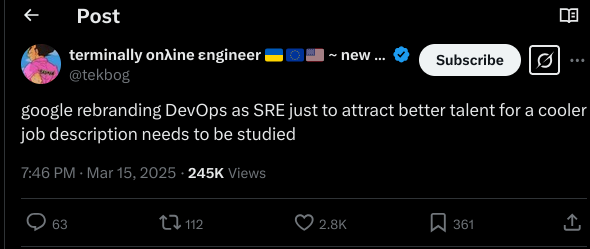SRE vs. DevOps - A Quick Guide for Confused Recruiters

As companies modernize their infrastructure, two critical but often confused roles emerge: Site Reliability Engineers (SREs) and DevOps Engineers. Let's clarify their differences and overlaps for technical recruiting.
The 60-Second Primer
DevOps 🔄
- Focus: Culture + practices bridging development & operations
- Key Metrics: Deployment frequency, lead time, mean time to recover
- Tools: Jenkins, Terraform, Ansible, Docker
- Origins: Evolved from Agile/Lean movements
SRE 🛡️
- Focus: System reliability + scalable operations
- Key Metrics: Uptime (SLA/SLO/SLI), error budgets, latency
- Tools: Prometheus, Grafana, PagerDuty, Istio
- Origins: Created at Google (2003)
Core Differences & Overlaps
| Aspect | DevOps | SRE | Overlap |
|---|---|---|---|
| Primary Goal | Faster, safer deployments | System reliability | Automation |
| Mindset | Cultural movement | Engineering discipline | Cloud-native focus |
| Work Output | CI/CD pipelines | Reliability measurements | Infrastructure as Code |
| Error Handling | "Fail fast" philosophy | Formal error budgets | Monitoring/alerting |
| Typical Background | Sysadmin + coding skills | Software engineering + ops | Cloud certifications |
When Companies Hire DevOps
Ideal Use Cases:
- Migrating legacy systems to cloud
- Building CI/CD pipelines from scratch
- Implementing infrastructure as code
- Improving developer-operations collaboration
Candidate Profile:
- Strong scripting skills (Python, Bash)
- Experience with cloud platforms (AWS/Azure/GCP)
- Knowledge of containerization (Docker/Kubernetes)
- Understanding of configuration management
When Companies Hire SREs
Ideal Use Cases:
- Maintaining >99.9% uptime requirements
- Managing large-scale distributed systems
- Implementing service level objectives (SLOs)
- Building self-healing systems
Candidate Profile:
- Strong coding skills (Go/Python/Java)
- Distributed systems experience
- Deep monitoring/observability knowledge
- Incident management expertise
Interview Red Flags 🚩
For DevOps Roles:
- Can't explain CI/CD pipeline components
- No experience with infrastructure as code
- Never used configuration management tools
- Can't describe cloud migration challenges
For SRE Roles:
- Unfamiliar with SLO/SLI concepts
- No incident postmortem experience
- Can't explain chaos engineering
- Never worked with error budgets
FAQ for Recruiters
Q: Can one person handle both roles?
A: In startups yes, but at scale they typically specialize
Q: Which role pays more?
A: SREs average 10-15% higher (2023 data)
Q: Key certifications?
A: DevOps: AWS DevOps Pro, SRE: Google's SRE cert
Q: Do they use similar tools?
A: Both use Terraform/Kubernetes, but SREs add monitoring stacks
Q: Can they work together?
A: Yes! DevOps builds deployment systems, SREs ensure reliability
Key Takeaways
- DevOps = Culture + practices for rapid delivery
- SRE = Engineering approach to reliability
- Look for SREs in scaling companies, DevOps in transforming ones
- Both require cloud + automation skills
- Certifications help but real-world experience is king
Want to go deeper? I wrote about Docker and containers which both roles heavily use.

